International Trade Finance & Investments: A Comprehensive Report
VerifiedAdded on 2023/01/03
|13
|3082
|83
Report
AI Summary
This report delves into the multifaceted world of international trade finance, examining the financial markets, capital allocation strategies, and the impact of trade policies, particularly within the contexts of the UK and the UAE. It provides an overview of financial markets, including stock, bond, commodities, derivative, and Forex markets, with a focus on the UK's position as a dynamic financial center. The report further analyzes capital allocation in both domestic and international markets, exploring strategies such as mergers and acquisitions and organic growth to enhance market presence. It addresses the significance of trade policies, including import restrictions and language barriers, and discusses the challenges and opportunities presented by industrialization and the theory of mercantilism. The report also covers risk management strategies and provides recommendations for navigating the complexities of international trade, offering valuable insights for junior consultants and stakeholders in the field.
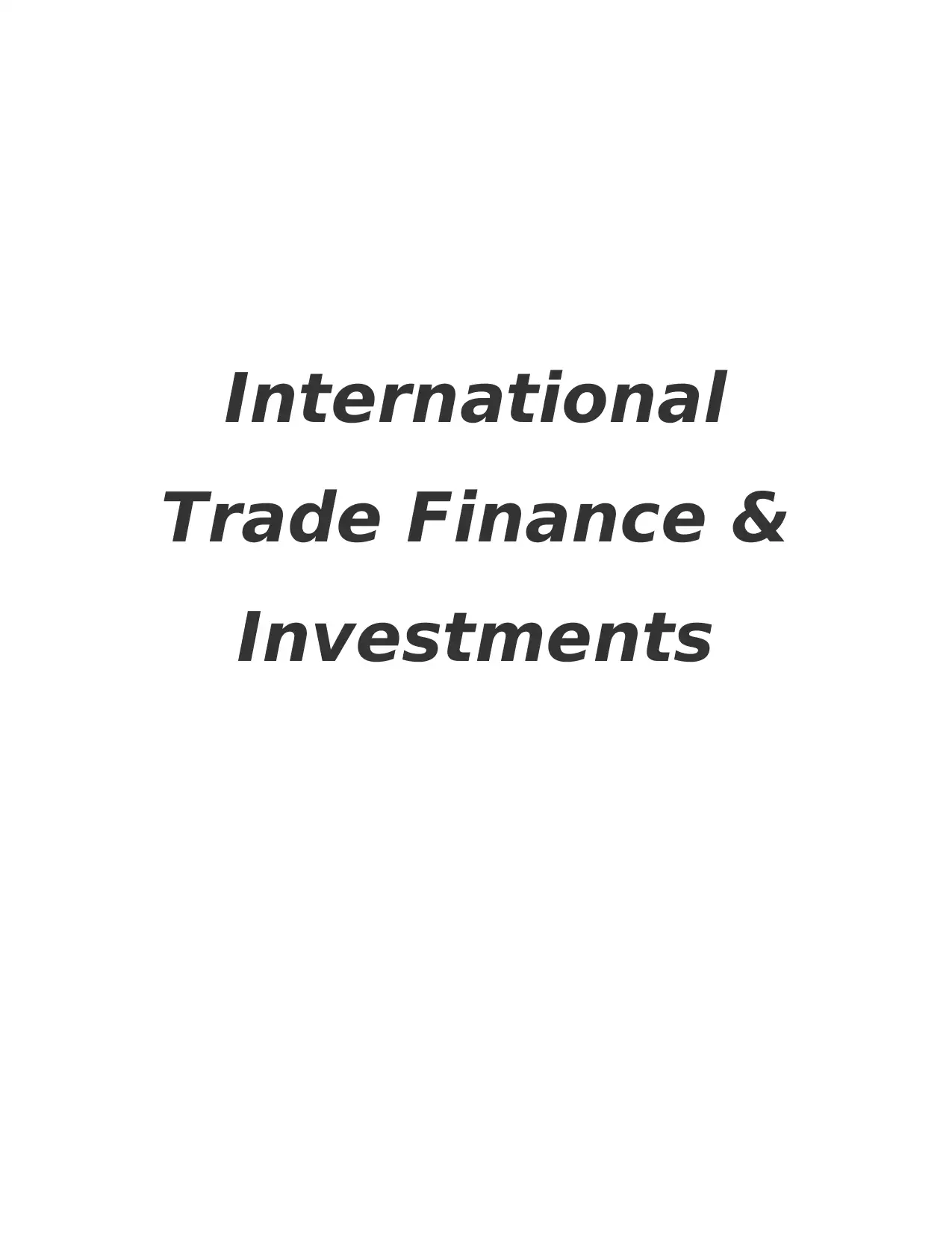
International
Trade Finance &
Investments
Trade Finance &
Investments
Paraphrase This Document
Need a fresh take? Get an instant paraphrase of this document with our AI Paraphraser
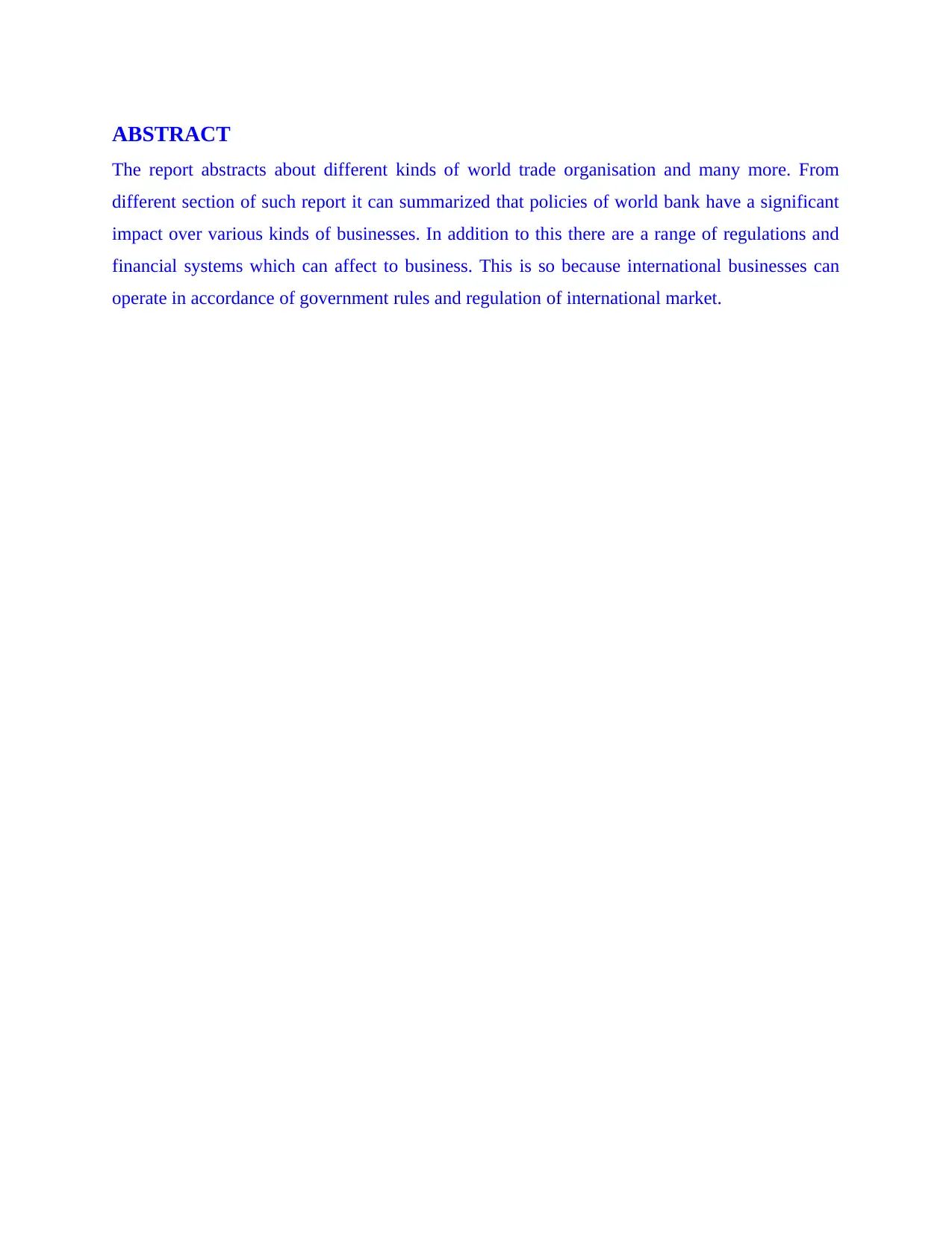
ABSTRACT
The report abstracts about different kinds of world trade organisation and many more. From
different section of such report it can summarized that policies of world bank have a significant
impact over various kinds of businesses. In addition to this there are a range of regulations and
financial systems which can affect to business. This is so because international businesses can
operate in accordance of government rules and regulation of international market.
The report abstracts about different kinds of world trade organisation and many more. From
different section of such report it can summarized that policies of world bank have a significant
impact over various kinds of businesses. In addition to this there are a range of regulations and
financial systems which can affect to business. This is so because international businesses can
operate in accordance of government rules and regulation of international market.
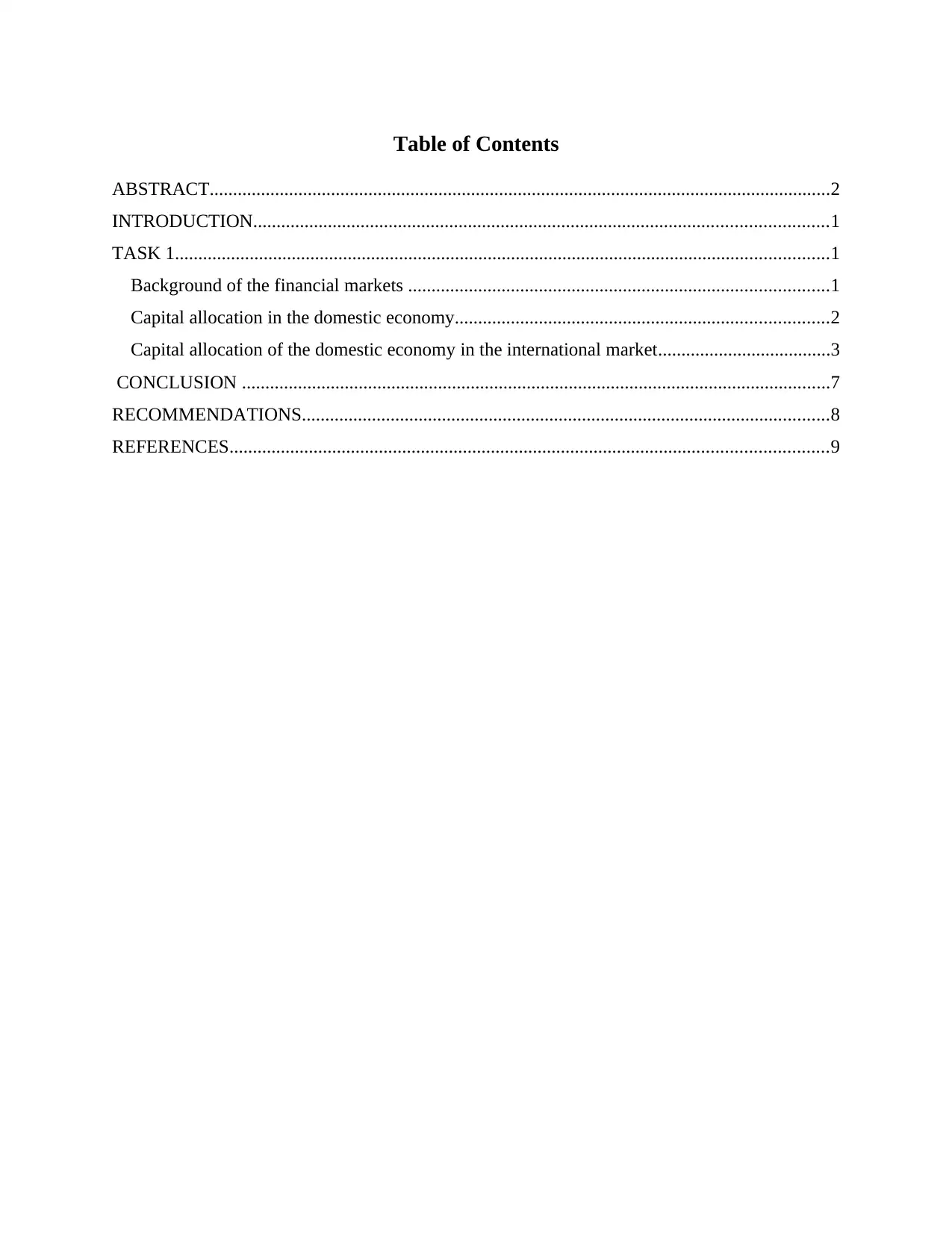
Table of Contents
ABSTRACT.....................................................................................................................................2
INTRODUCTION...........................................................................................................................1
TASK 1............................................................................................................................................1
Background of the financial markets ..........................................................................................1
Capital allocation in the domestic economy................................................................................2
Capital allocation of the domestic economy in the international market.....................................3
CONCLUSION ..............................................................................................................................7
RECOMMENDATIONS.................................................................................................................8
REFERENCES................................................................................................................................9
ABSTRACT.....................................................................................................................................2
INTRODUCTION...........................................................................................................................1
TASK 1............................................................................................................................................1
Background of the financial markets ..........................................................................................1
Capital allocation in the domestic economy................................................................................2
Capital allocation of the domestic economy in the international market.....................................3
CONCLUSION ..............................................................................................................................7
RECOMMENDATIONS.................................................................................................................8
REFERENCES................................................................................................................................9
⊘ This is a preview!⊘
Do you want full access?
Subscribe today to unlock all pages.

Trusted by 1+ million students worldwide
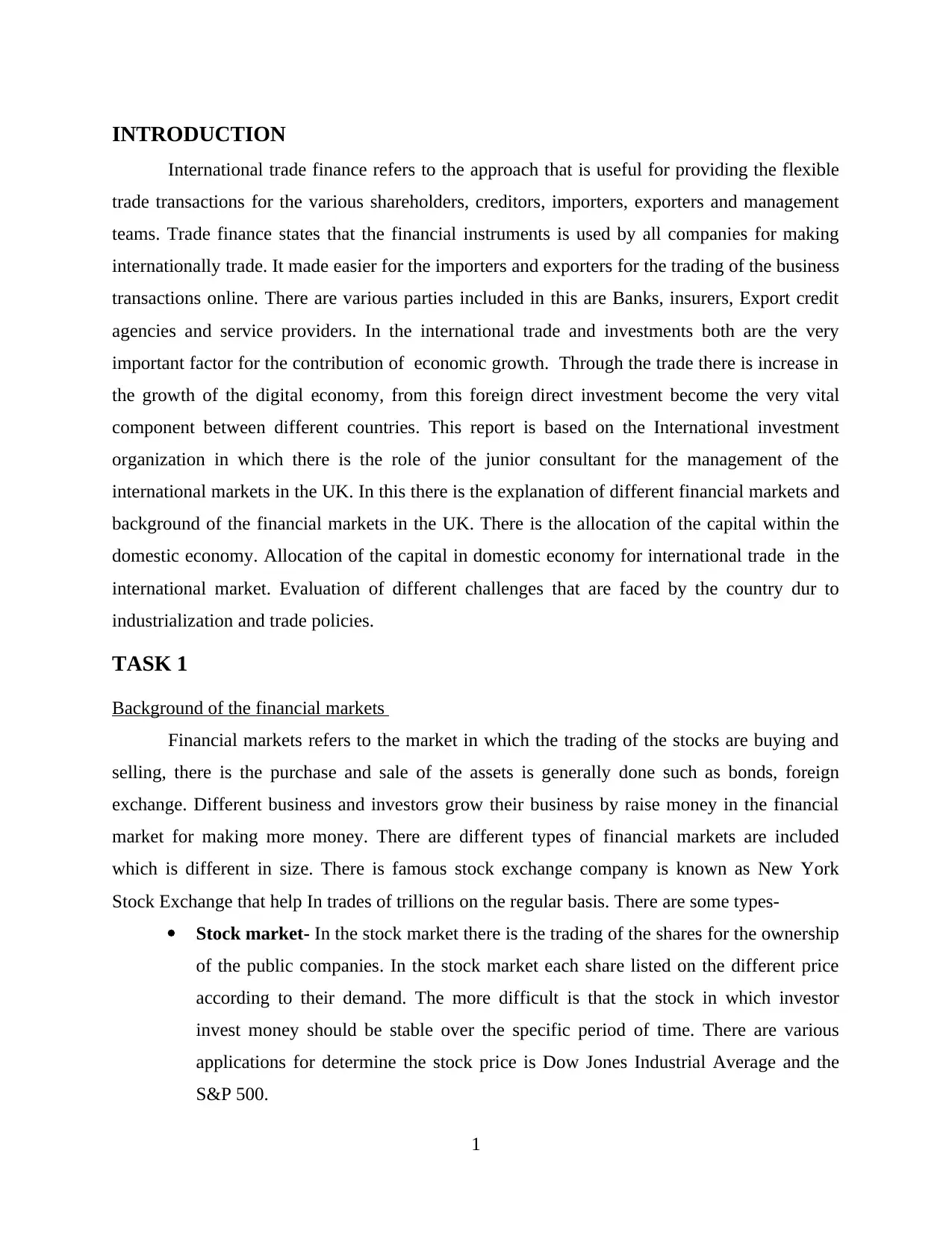
INTRODUCTION
International trade finance refers to the approach that is useful for providing the flexible
trade transactions for the various shareholders, creditors, importers, exporters and management
teams. Trade finance states that the financial instruments is used by all companies for making
internationally trade. It made easier for the importers and exporters for the trading of the business
transactions online. There are various parties included in this are Banks, insurers, Export credit
agencies and service providers. In the international trade and investments both are the very
important factor for the contribution of economic growth. Through the trade there is increase in
the growth of the digital economy, from this foreign direct investment become the very vital
component between different countries. This report is based on the International investment
organization in which there is the role of the junior consultant for the management of the
international markets in the UK. In this there is the explanation of different financial markets and
background of the financial markets in the UK. There is the allocation of the capital within the
domestic economy. Allocation of the capital in domestic economy for international trade in the
international market. Evaluation of different challenges that are faced by the country dur to
industrialization and trade policies.
TASK 1
Background of the financial markets
Financial markets refers to the market in which the trading of the stocks are buying and
selling, there is the purchase and sale of the assets is generally done such as bonds, foreign
exchange. Different business and investors grow their business by raise money in the financial
market for making more money. There are different types of financial markets are included
which is different in size. There is famous stock exchange company is known as New York
Stock Exchange that help In trades of trillions on the regular basis. There are some types-
Stock market- In the stock market there is the trading of the shares for the ownership
of the public companies. In the stock market each share listed on the different price
according to their demand. The more difficult is that the stock in which investor
invest money should be stable over the specific period of time. There are various
applications for determine the stock price is Dow Jones Industrial Average and the
S&P 500.
1
International trade finance refers to the approach that is useful for providing the flexible
trade transactions for the various shareholders, creditors, importers, exporters and management
teams. Trade finance states that the financial instruments is used by all companies for making
internationally trade. It made easier for the importers and exporters for the trading of the business
transactions online. There are various parties included in this are Banks, insurers, Export credit
agencies and service providers. In the international trade and investments both are the very
important factor for the contribution of economic growth. Through the trade there is increase in
the growth of the digital economy, from this foreign direct investment become the very vital
component between different countries. This report is based on the International investment
organization in which there is the role of the junior consultant for the management of the
international markets in the UK. In this there is the explanation of different financial markets and
background of the financial markets in the UK. There is the allocation of the capital within the
domestic economy. Allocation of the capital in domestic economy for international trade in the
international market. Evaluation of different challenges that are faced by the country dur to
industrialization and trade policies.
TASK 1
Background of the financial markets
Financial markets refers to the market in which the trading of the stocks are buying and
selling, there is the purchase and sale of the assets is generally done such as bonds, foreign
exchange. Different business and investors grow their business by raise money in the financial
market for making more money. There are different types of financial markets are included
which is different in size. There is famous stock exchange company is known as New York
Stock Exchange that help In trades of trillions on the regular basis. There are some types-
Stock market- In the stock market there is the trading of the shares for the ownership
of the public companies. In the stock market each share listed on the different price
according to their demand. The more difficult is that the stock in which investor
invest money should be stable over the specific period of time. There are various
applications for determine the stock price is Dow Jones Industrial Average and the
S&P 500.
1
Paraphrase This Document
Need a fresh take? Get an instant paraphrase of this document with our AI Paraphraser
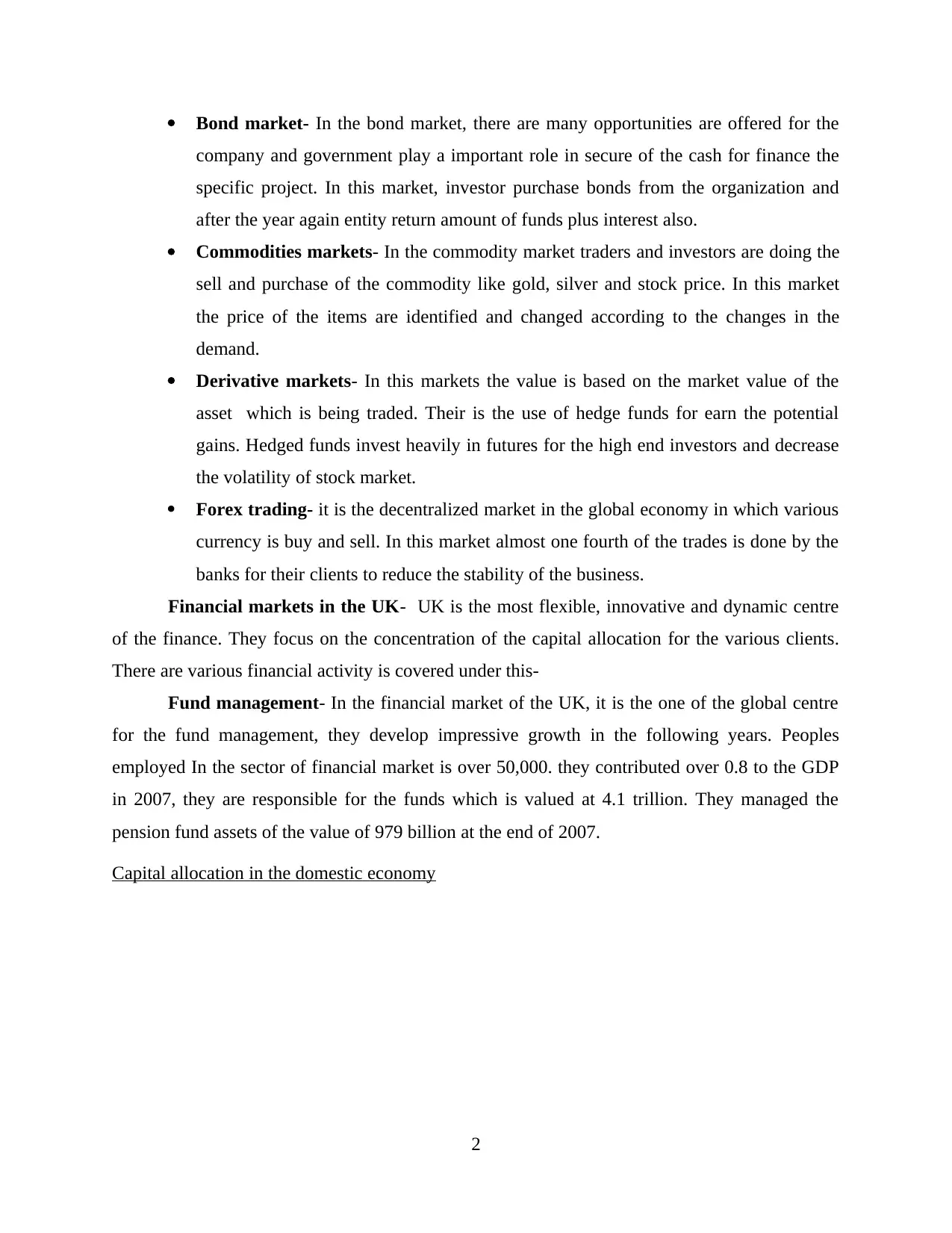
Bond market- In the bond market, there are many opportunities are offered for the
company and government play a important role in secure of the cash for finance the
specific project. In this market, investor purchase bonds from the organization and
after the year again entity return amount of funds plus interest also.
Commodities markets- In the commodity market traders and investors are doing the
sell and purchase of the commodity like gold, silver and stock price. In this market
the price of the items are identified and changed according to the changes in the
demand.
Derivative markets- In this markets the value is based on the market value of the
asset which is being traded. Their is the use of hedge funds for earn the potential
gains. Hedged funds invest heavily in futures for the high end investors and decrease
the volatility of stock market.
Forex trading- it is the decentralized market in the global economy in which various
currency is buy and sell. In this market almost one fourth of the trades is done by the
banks for their clients to reduce the stability of the business.
Financial markets in the UK- UK is the most flexible, innovative and dynamic centre
of the finance. They focus on the concentration of the capital allocation for the various clients.
There are various financial activity is covered under this-
Fund management- In the financial market of the UK, it is the one of the global centre
for the fund management, they develop impressive growth in the following years. Peoples
employed In the sector of financial market is over 50,000. they contributed over 0.8 to the GDP
in 2007, they are responsible for the funds which is valued at 4.1 trillion. They managed the
pension fund assets of the value of 979 billion at the end of 2007.
Capital allocation in the domestic economy
2
company and government play a important role in secure of the cash for finance the
specific project. In this market, investor purchase bonds from the organization and
after the year again entity return amount of funds plus interest also.
Commodities markets- In the commodity market traders and investors are doing the
sell and purchase of the commodity like gold, silver and stock price. In this market
the price of the items are identified and changed according to the changes in the
demand.
Derivative markets- In this markets the value is based on the market value of the
asset which is being traded. Their is the use of hedge funds for earn the potential
gains. Hedged funds invest heavily in futures for the high end investors and decrease
the volatility of stock market.
Forex trading- it is the decentralized market in the global economy in which various
currency is buy and sell. In this market almost one fourth of the trades is done by the
banks for their clients to reduce the stability of the business.
Financial markets in the UK- UK is the most flexible, innovative and dynamic centre
of the finance. They focus on the concentration of the capital allocation for the various clients.
There are various financial activity is covered under this-
Fund management- In the financial market of the UK, it is the one of the global centre
for the fund management, they develop impressive growth in the following years. Peoples
employed In the sector of financial market is over 50,000. they contributed over 0.8 to the GDP
in 2007, they are responsible for the funds which is valued at 4.1 trillion. They managed the
pension fund assets of the value of 979 billion at the end of 2007.
Capital allocation in the domestic economy
2
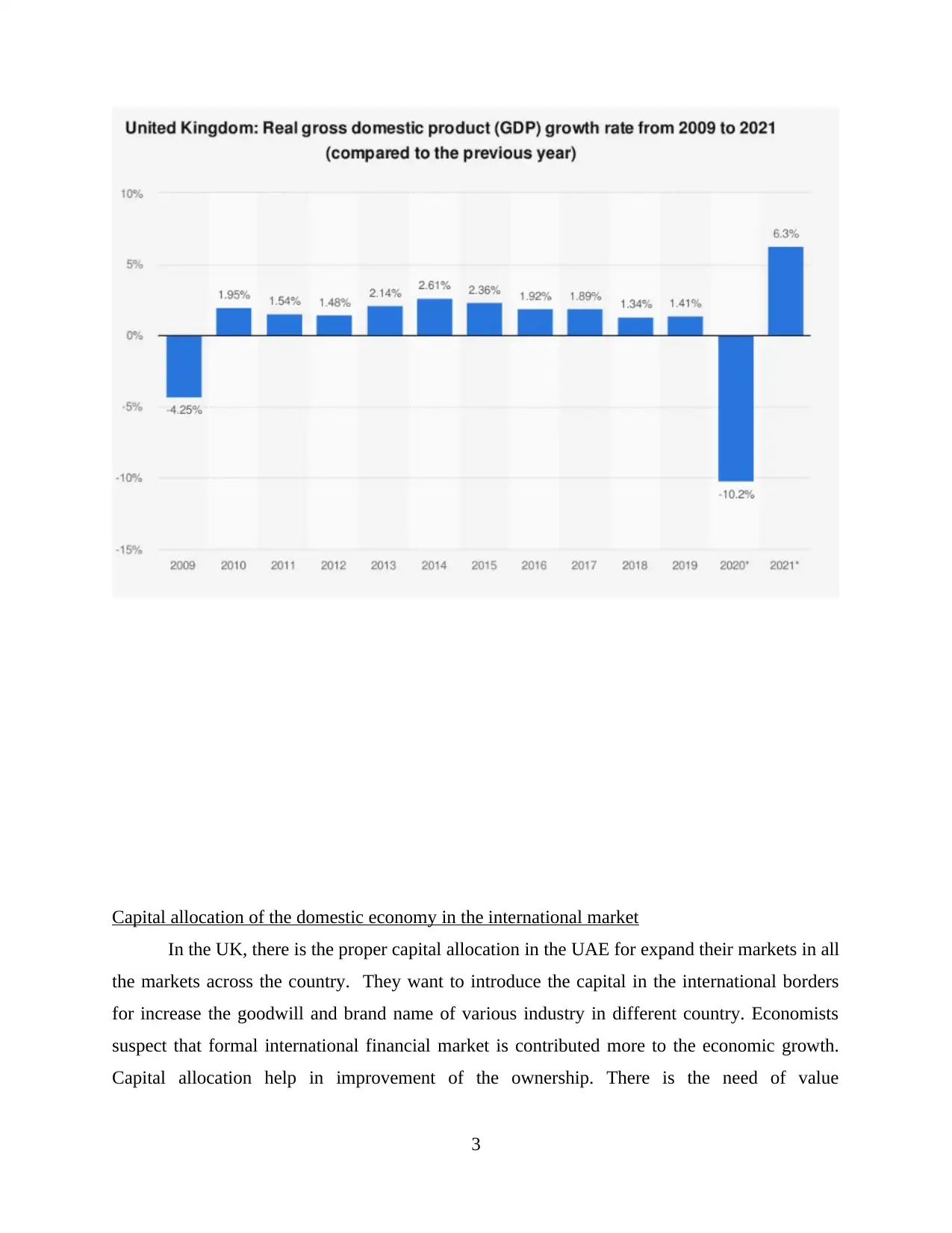
Capital allocation of the domestic economy in the international market
In the UK, there is the proper capital allocation in the UAE for expand their markets in all
the markets across the country. They want to introduce the capital in the international borders
for increase the goodwill and brand name of various industry in different country. Economists
suspect that formal international financial market is contributed more to the economic growth.
Capital allocation help in improvement of the ownership. There is the need of value
3
In the UK, there is the proper capital allocation in the UAE for expand their markets in all
the markets across the country. They want to introduce the capital in the international borders
for increase the goodwill and brand name of various industry in different country. Economists
suspect that formal international financial market is contributed more to the economic growth.
Capital allocation help in improvement of the ownership. There is the need of value
3
⊘ This is a preview!⊘
Do you want full access?
Subscribe today to unlock all pages.

Trusted by 1+ million students worldwide
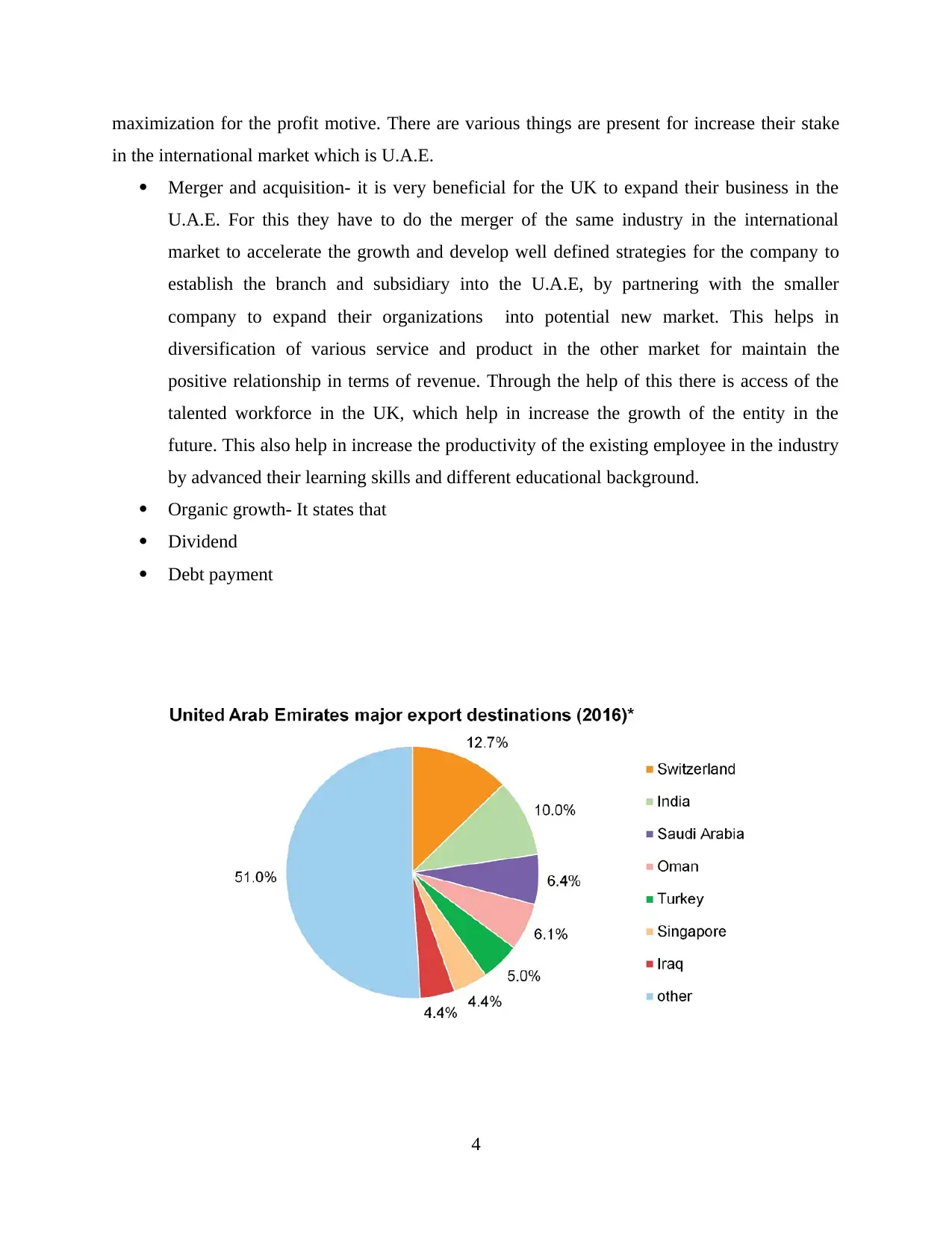
maximization for the profit motive. There are various things are present for increase their stake
in the international market which is U.A.E.
Merger and acquisition- it is very beneficial for the UK to expand their business in the
U.A.E. For this they have to do the merger of the same industry in the international
market to accelerate the growth and develop well defined strategies for the company to
establish the branch and subsidiary into the U.A.E, by partnering with the smaller
company to expand their organizations into potential new market. This helps in
diversification of various service and product in the other market for maintain the
positive relationship in terms of revenue. Through the help of this there is access of the
talented workforce in the UK, which help in increase the growth of the entity in the
future. This also help in increase the productivity of the existing employee in the industry
by advanced their learning skills and different educational background.
Organic growth- It states that
Dividend
Debt payment
4
in the international market which is U.A.E.
Merger and acquisition- it is very beneficial for the UK to expand their business in the
U.A.E. For this they have to do the merger of the same industry in the international
market to accelerate the growth and develop well defined strategies for the company to
establish the branch and subsidiary into the U.A.E, by partnering with the smaller
company to expand their organizations into potential new market. This helps in
diversification of various service and product in the other market for maintain the
positive relationship in terms of revenue. Through the help of this there is access of the
talented workforce in the UK, which help in increase the growth of the entity in the
future. This also help in increase the productivity of the existing employee in the industry
by advanced their learning skills and different educational background.
Organic growth- It states that
Dividend
Debt payment
4
Paraphrase This Document
Need a fresh take? Get an instant paraphrase of this document with our AI Paraphraser
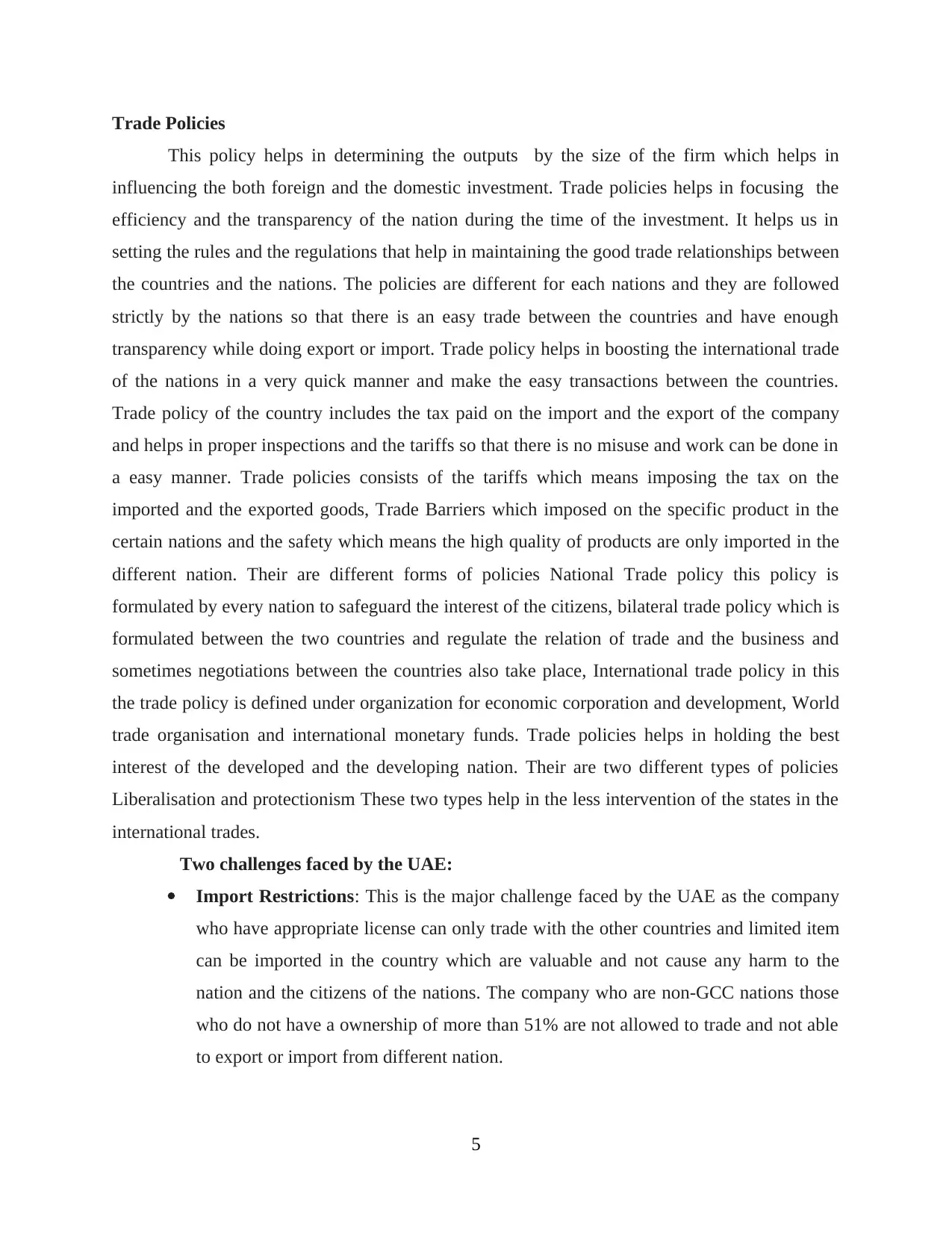
Trade Policies
This policy helps in determining the outputs by the size of the firm which helps in
influencing the both foreign and the domestic investment. Trade policies helps in focusing the
efficiency and the transparency of the nation during the time of the investment. It helps us in
setting the rules and the regulations that help in maintaining the good trade relationships between
the countries and the nations. The policies are different for each nations and they are followed
strictly by the nations so that there is an easy trade between the countries and have enough
transparency while doing export or import. Trade policy helps in boosting the international trade
of the nations in a very quick manner and make the easy transactions between the countries.
Trade policy of the country includes the tax paid on the import and the export of the company
and helps in proper inspections and the tariffs so that there is no misuse and work can be done in
a easy manner. Trade policies consists of the tariffs which means imposing the tax on the
imported and the exported goods, Trade Barriers which imposed on the specific product in the
certain nations and the safety which means the high quality of products are only imported in the
different nation. Their are different forms of policies National Trade policy this policy is
formulated by every nation to safeguard the interest of the citizens, bilateral trade policy which is
formulated between the two countries and regulate the relation of trade and the business and
sometimes negotiations between the countries also take place, International trade policy in this
the trade policy is defined under organization for economic corporation and development, World
trade organisation and international monetary funds. Trade policies helps in holding the best
interest of the developed and the developing nation. Their are two different types of policies
Liberalisation and protectionism These two types help in the less intervention of the states in the
international trades.
Two challenges faced by the UAE:
Import Restrictions: This is the major challenge faced by the UAE as the company
who have appropriate license can only trade with the other countries and limited item
can be imported in the country which are valuable and not cause any harm to the
nation and the citizens of the nations. The company who are non-GCC nations those
who do not have a ownership of more than 51% are not allowed to trade and not able
to export or import from different nation.
5
This policy helps in determining the outputs by the size of the firm which helps in
influencing the both foreign and the domestic investment. Trade policies helps in focusing the
efficiency and the transparency of the nation during the time of the investment. It helps us in
setting the rules and the regulations that help in maintaining the good trade relationships between
the countries and the nations. The policies are different for each nations and they are followed
strictly by the nations so that there is an easy trade between the countries and have enough
transparency while doing export or import. Trade policy helps in boosting the international trade
of the nations in a very quick manner and make the easy transactions between the countries.
Trade policy of the country includes the tax paid on the import and the export of the company
and helps in proper inspections and the tariffs so that there is no misuse and work can be done in
a easy manner. Trade policies consists of the tariffs which means imposing the tax on the
imported and the exported goods, Trade Barriers which imposed on the specific product in the
certain nations and the safety which means the high quality of products are only imported in the
different nation. Their are different forms of policies National Trade policy this policy is
formulated by every nation to safeguard the interest of the citizens, bilateral trade policy which is
formulated between the two countries and regulate the relation of trade and the business and
sometimes negotiations between the countries also take place, International trade policy in this
the trade policy is defined under organization for economic corporation and development, World
trade organisation and international monetary funds. Trade policies helps in holding the best
interest of the developed and the developing nation. Their are two different types of policies
Liberalisation and protectionism These two types help in the less intervention of the states in the
international trades.
Two challenges faced by the UAE:
Import Restrictions: This is the major challenge faced by the UAE as the company
who have appropriate license can only trade with the other countries and limited item
can be imported in the country which are valuable and not cause any harm to the
nation and the citizens of the nations. The company who are non-GCC nations those
who do not have a ownership of more than 51% are not allowed to trade and not able
to export or import from different nation.
5
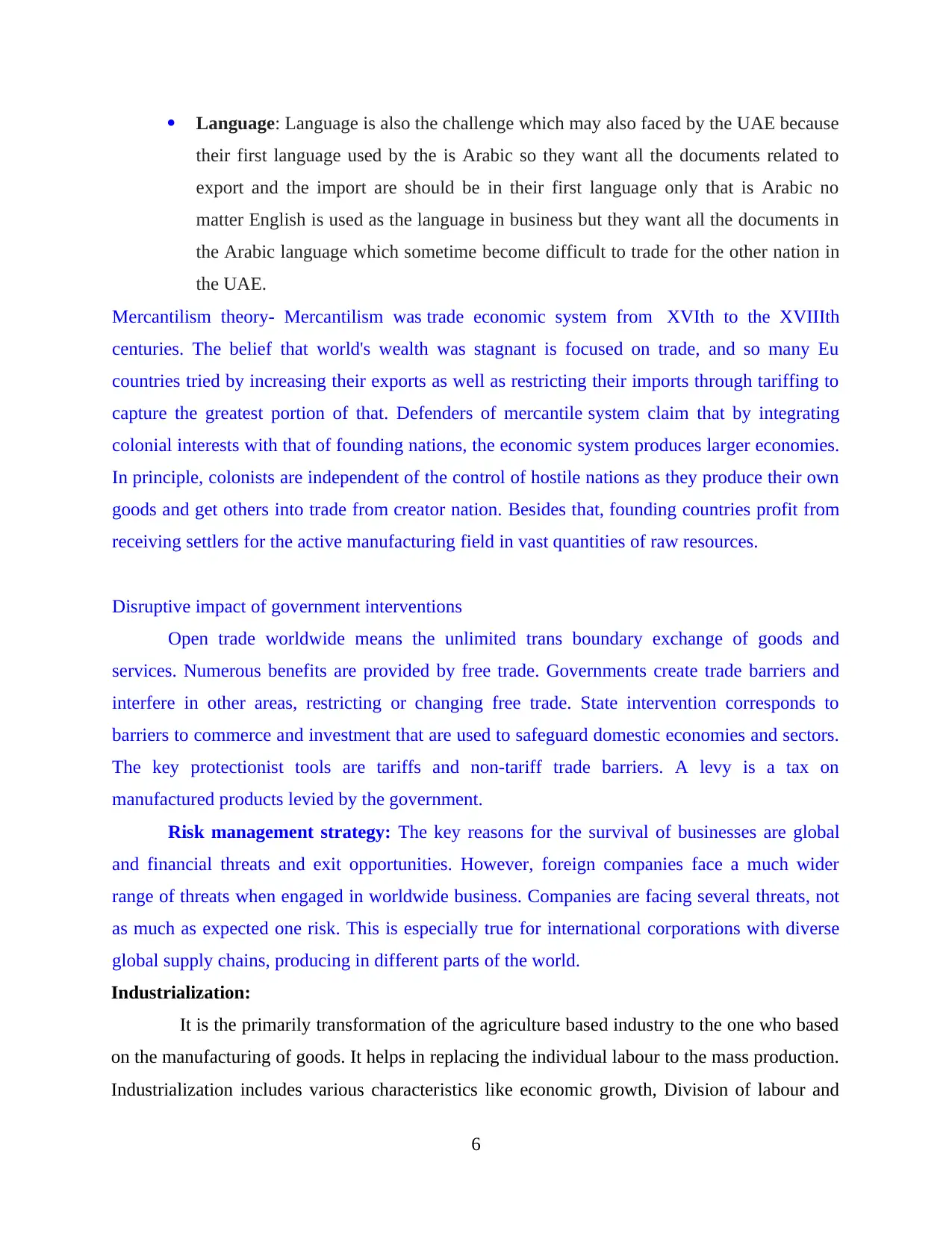
Language: Language is also the challenge which may also faced by the UAE because
their first language used by the is Arabic so they want all the documents related to
export and the import are should be in their first language only that is Arabic no
matter English is used as the language in business but they want all the documents in
the Arabic language which sometime become difficult to trade for the other nation in
the UAE.
Mercantilism theory- Mercantilism was trade economic system from XVIth to the XVIIIth
centuries. The belief that world's wealth was stagnant is focused on trade, and so many Eu
countries tried by increasing their exports as well as restricting their imports through tariffing to
capture the greatest portion of that. Defenders of mercantile system claim that by integrating
colonial interests with that of founding nations, the economic system produces larger economies.
In principle, colonists are independent of the control of hostile nations as they produce their own
goods and get others into trade from creator nation. Besides that, founding countries profit from
receiving settlers for the active manufacturing field in vast quantities of raw resources.
Disruptive impact of government interventions
Open trade worldwide means the unlimited trans boundary exchange of goods and
services. Numerous benefits are provided by free trade. Governments create trade barriers and
interfere in other areas, restricting or changing free trade. State intervention corresponds to
barriers to commerce and investment that are used to safeguard domestic economies and sectors.
The key protectionist tools are tariffs and non-tariff trade barriers. A levy is a tax on
manufactured products levied by the government.
Risk management strategy: The key reasons for the survival of businesses are global
and financial threats and exit opportunities. However, foreign companies face a much wider
range of threats when engaged in worldwide business. Companies are facing several threats, not
as much as expected one risk. This is especially true for international corporations with diverse
global supply chains, producing in different parts of the world.
Industrialization:
It is the primarily transformation of the agriculture based industry to the one who based
on the manufacturing of goods. It helps in replacing the individual labour to the mass production.
Industrialization includes various characteristics like economic growth, Division of labour and
6
their first language used by the is Arabic so they want all the documents related to
export and the import are should be in their first language only that is Arabic no
matter English is used as the language in business but they want all the documents in
the Arabic language which sometime become difficult to trade for the other nation in
the UAE.
Mercantilism theory- Mercantilism was trade economic system from XVIth to the XVIIIth
centuries. The belief that world's wealth was stagnant is focused on trade, and so many Eu
countries tried by increasing their exports as well as restricting their imports through tariffing to
capture the greatest portion of that. Defenders of mercantile system claim that by integrating
colonial interests with that of founding nations, the economic system produces larger economies.
In principle, colonists are independent of the control of hostile nations as they produce their own
goods and get others into trade from creator nation. Besides that, founding countries profit from
receiving settlers for the active manufacturing field in vast quantities of raw resources.
Disruptive impact of government interventions
Open trade worldwide means the unlimited trans boundary exchange of goods and
services. Numerous benefits are provided by free trade. Governments create trade barriers and
interfere in other areas, restricting or changing free trade. State intervention corresponds to
barriers to commerce and investment that are used to safeguard domestic economies and sectors.
The key protectionist tools are tariffs and non-tariff trade barriers. A levy is a tax on
manufactured products levied by the government.
Risk management strategy: The key reasons for the survival of businesses are global
and financial threats and exit opportunities. However, foreign companies face a much wider
range of threats when engaged in worldwide business. Companies are facing several threats, not
as much as expected one risk. This is especially true for international corporations with diverse
global supply chains, producing in different parts of the world.
Industrialization:
It is the primarily transformation of the agriculture based industry to the one who based
on the manufacturing of goods. It helps in replacing the individual labour to the mass production.
Industrialization includes various characteristics like economic growth, Division of labour and
6
⊘ This is a preview!⊘
Do you want full access?
Subscribe today to unlock all pages.

Trusted by 1+ million students worldwide
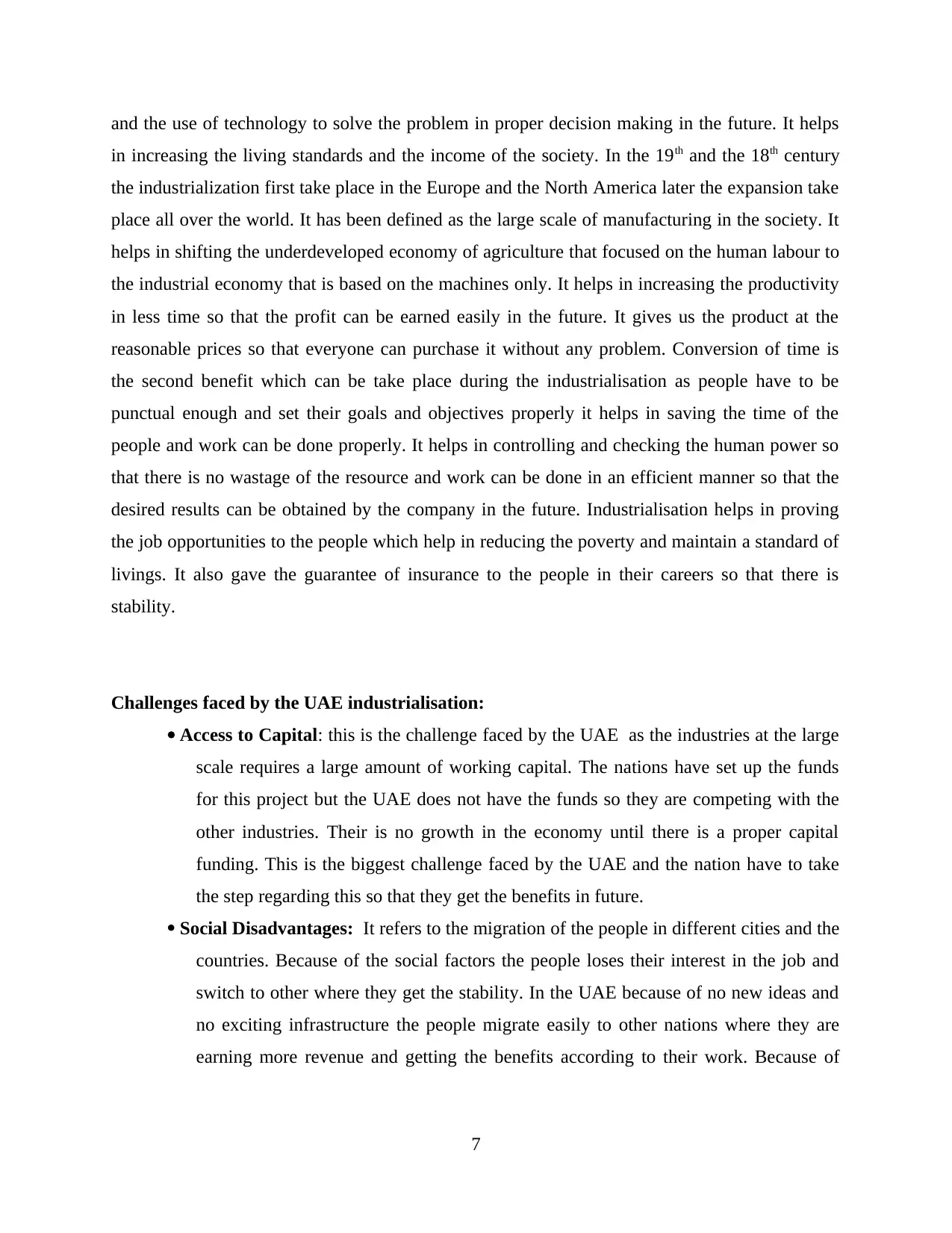
and the use of technology to solve the problem in proper decision making in the future. It helps
in increasing the living standards and the income of the society. In the 19th and the 18th century
the industrialization first take place in the Europe and the North America later the expansion take
place all over the world. It has been defined as the large scale of manufacturing in the society. It
helps in shifting the underdeveloped economy of agriculture that focused on the human labour to
the industrial economy that is based on the machines only. It helps in increasing the productivity
in less time so that the profit can be earned easily in the future. It gives us the product at the
reasonable prices so that everyone can purchase it without any problem. Conversion of time is
the second benefit which can be take place during the industrialisation as people have to be
punctual enough and set their goals and objectives properly it helps in saving the time of the
people and work can be done properly. It helps in controlling and checking the human power so
that there is no wastage of the resource and work can be done in an efficient manner so that the
desired results can be obtained by the company in the future. Industrialisation helps in proving
the job opportunities to the people which help in reducing the poverty and maintain a standard of
livings. It also gave the guarantee of insurance to the people in their careers so that there is
stability.
Challenges faced by the UAE industrialisation:
Access to Capital: this is the challenge faced by the UAE as the industries at the large
scale requires a large amount of working capital. The nations have set up the funds
for this project but the UAE does not have the funds so they are competing with the
other industries. Their is no growth in the economy until there is a proper capital
funding. This is the biggest challenge faced by the UAE and the nation have to take
the step regarding this so that they get the benefits in future.
Social Disadvantages: It refers to the migration of the people in different cities and the
countries. Because of the social factors the people loses their interest in the job and
switch to other where they get the stability. In the UAE because of no new ideas and
no exciting infrastructure the people migrate easily to other nations where they are
earning more revenue and getting the benefits according to their work. Because of
7
in increasing the living standards and the income of the society. In the 19th and the 18th century
the industrialization first take place in the Europe and the North America later the expansion take
place all over the world. It has been defined as the large scale of manufacturing in the society. It
helps in shifting the underdeveloped economy of agriculture that focused on the human labour to
the industrial economy that is based on the machines only. It helps in increasing the productivity
in less time so that the profit can be earned easily in the future. It gives us the product at the
reasonable prices so that everyone can purchase it without any problem. Conversion of time is
the second benefit which can be take place during the industrialisation as people have to be
punctual enough and set their goals and objectives properly it helps in saving the time of the
people and work can be done properly. It helps in controlling and checking the human power so
that there is no wastage of the resource and work can be done in an efficient manner so that the
desired results can be obtained by the company in the future. Industrialisation helps in proving
the job opportunities to the people which help in reducing the poverty and maintain a standard of
livings. It also gave the guarantee of insurance to the people in their careers so that there is
stability.
Challenges faced by the UAE industrialisation:
Access to Capital: this is the challenge faced by the UAE as the industries at the large
scale requires a large amount of working capital. The nations have set up the funds
for this project but the UAE does not have the funds so they are competing with the
other industries. Their is no growth in the economy until there is a proper capital
funding. This is the biggest challenge faced by the UAE and the nation have to take
the step regarding this so that they get the benefits in future.
Social Disadvantages: It refers to the migration of the people in different cities and the
countries. Because of the social factors the people loses their interest in the job and
switch to other where they get the stability. In the UAE because of no new ideas and
no exciting infrastructure the people migrate easily to other nations where they are
earning more revenue and getting the benefits according to their work. Because of
7
Paraphrase This Document
Need a fresh take? Get an instant paraphrase of this document with our AI Paraphraser
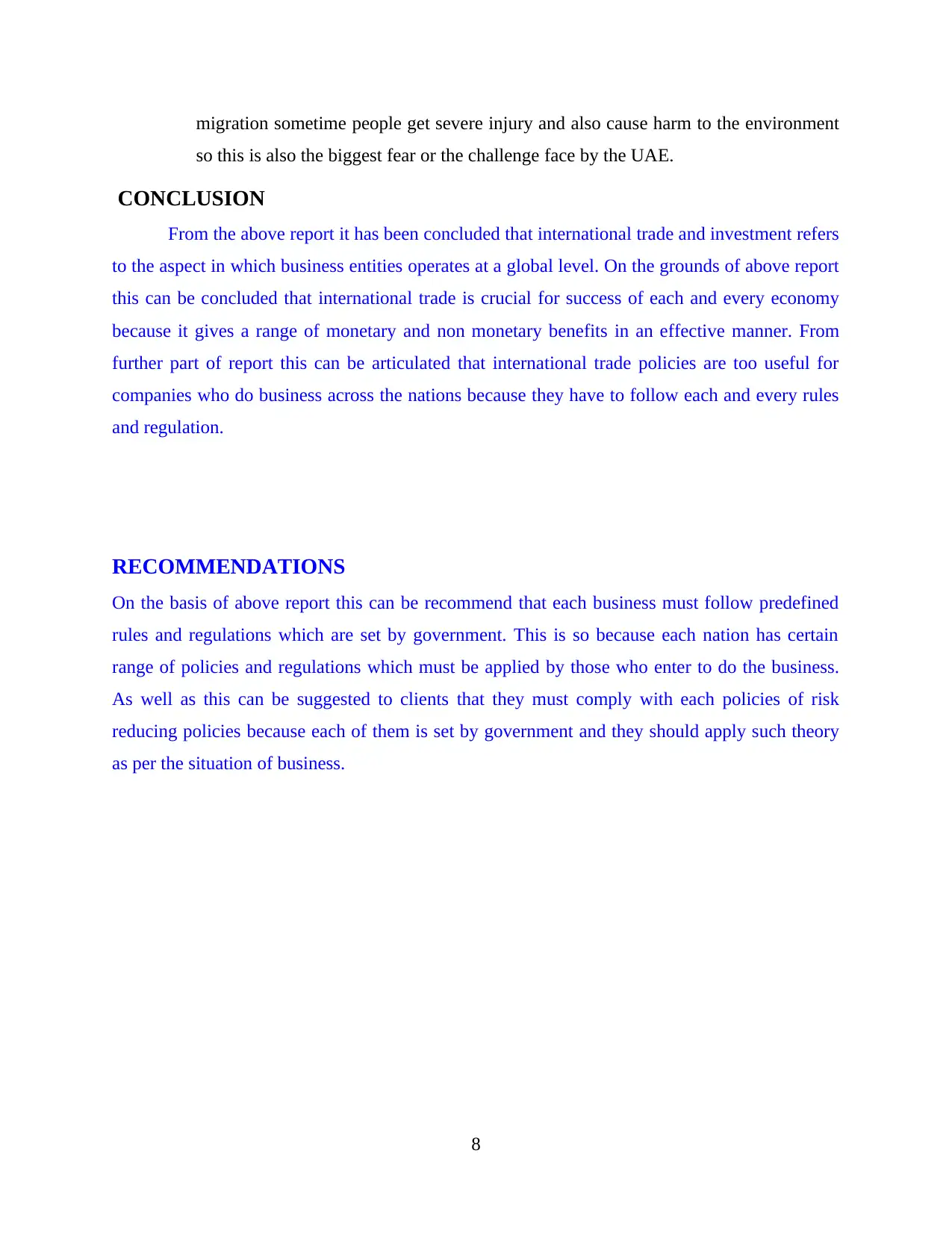
migration sometime people get severe injury and also cause harm to the environment
so this is also the biggest fear or the challenge face by the UAE.
CONCLUSION
From the above report it has been concluded that international trade and investment refers
to the aspect in which business entities operates at a global level. On the grounds of above report
this can be concluded that international trade is crucial for success of each and every economy
because it gives a range of monetary and non monetary benefits in an effective manner. From
further part of report this can be articulated that international trade policies are too useful for
companies who do business across the nations because they have to follow each and every rules
and regulation.
RECOMMENDATIONS
On the basis of above report this can be recommend that each business must follow predefined
rules and regulations which are set by government. This is so because each nation has certain
range of policies and regulations which must be applied by those who enter to do the business.
As well as this can be suggested to clients that they must comply with each policies of risk
reducing policies because each of them is set by government and they should apply such theory
as per the situation of business.
8
so this is also the biggest fear or the challenge face by the UAE.
CONCLUSION
From the above report it has been concluded that international trade and investment refers
to the aspect in which business entities operates at a global level. On the grounds of above report
this can be concluded that international trade is crucial for success of each and every economy
because it gives a range of monetary and non monetary benefits in an effective manner. From
further part of report this can be articulated that international trade policies are too useful for
companies who do business across the nations because they have to follow each and every rules
and regulation.
RECOMMENDATIONS
On the basis of above report this can be recommend that each business must follow predefined
rules and regulations which are set by government. This is so because each nation has certain
range of policies and regulations which must be applied by those who enter to do the business.
As well as this can be suggested to clients that they must comply with each policies of risk
reducing policies because each of them is set by government and they should apply such theory
as per the situation of business.
8
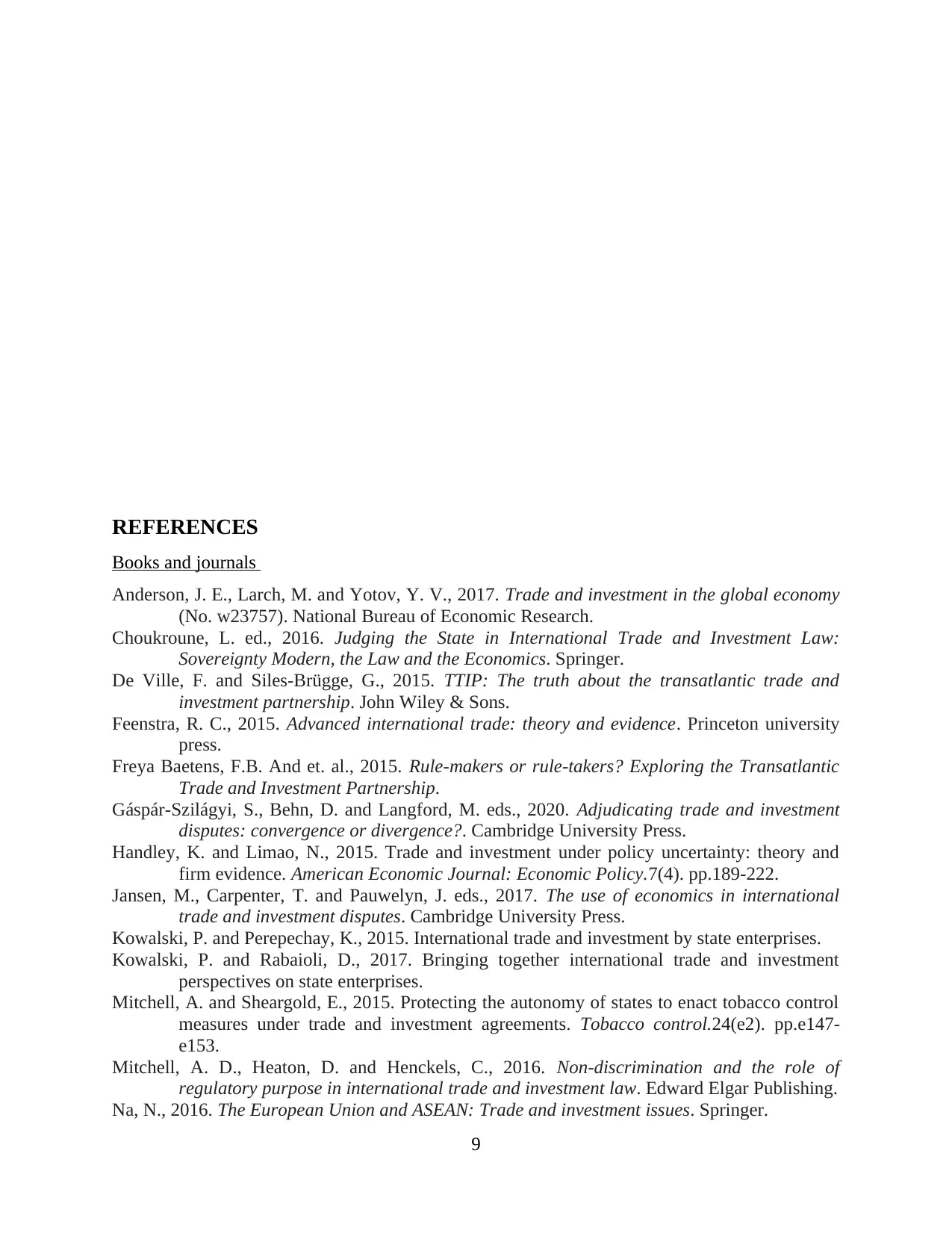
REFERENCES
Books and journals
Anderson, J. E., Larch, M. and Yotov, Y. V., 2017. Trade and investment in the global economy
(No. w23757). National Bureau of Economic Research.
Choukroune, L. ed., 2016. Judging the State in International Trade and Investment Law:
Sovereignty Modern, the Law and the Economics. Springer.
De Ville, F. and Siles-Brügge, G., 2015. TTIP: The truth about the transatlantic trade and
investment partnership. John Wiley & Sons.
Feenstra, R. C., 2015. Advanced international trade: theory and evidence. Princeton university
press.
Freya Baetens, F.B. And et. al., 2015. Rule-makers or rule-takers? Exploring the Transatlantic
Trade and Investment Partnership.
Gáspár-Szilágyi, S., Behn, D. and Langford, M. eds., 2020. Adjudicating trade and investment
disputes: convergence or divergence?. Cambridge University Press.
Handley, K. and Limao, N., 2015. Trade and investment under policy uncertainty: theory and
firm evidence. American Economic Journal: Economic Policy.7(4). pp.189-222.
Jansen, M., Carpenter, T. and Pauwelyn, J. eds., 2017. The use of economics in international
trade and investment disputes. Cambridge University Press.
Kowalski, P. and Perepechay, K., 2015. International trade and investment by state enterprises.
Kowalski, P. and Rabaioli, D., 2017. Bringing together international trade and investment
perspectives on state enterprises.
Mitchell, A. and Sheargold, E., 2015. Protecting the autonomy of states to enact tobacco control
measures under trade and investment agreements. Tobacco control.24(e2). pp.e147-
e153.
Mitchell, A. D., Heaton, D. and Henckels, C., 2016. Non-discrimination and the role of
regulatory purpose in international trade and investment law. Edward Elgar Publishing.
Na, N., 2016. The European Union and ASEAN: Trade and investment issues. Springer.
9
Books and journals
Anderson, J. E., Larch, M. and Yotov, Y. V., 2017. Trade and investment in the global economy
(No. w23757). National Bureau of Economic Research.
Choukroune, L. ed., 2016. Judging the State in International Trade and Investment Law:
Sovereignty Modern, the Law and the Economics. Springer.
De Ville, F. and Siles-Brügge, G., 2015. TTIP: The truth about the transatlantic trade and
investment partnership. John Wiley & Sons.
Feenstra, R. C., 2015. Advanced international trade: theory and evidence. Princeton university
press.
Freya Baetens, F.B. And et. al., 2015. Rule-makers or rule-takers? Exploring the Transatlantic
Trade and Investment Partnership.
Gáspár-Szilágyi, S., Behn, D. and Langford, M. eds., 2020. Adjudicating trade and investment
disputes: convergence or divergence?. Cambridge University Press.
Handley, K. and Limao, N., 2015. Trade and investment under policy uncertainty: theory and
firm evidence. American Economic Journal: Economic Policy.7(4). pp.189-222.
Jansen, M., Carpenter, T. and Pauwelyn, J. eds., 2017. The use of economics in international
trade and investment disputes. Cambridge University Press.
Kowalski, P. and Perepechay, K., 2015. International trade and investment by state enterprises.
Kowalski, P. and Rabaioli, D., 2017. Bringing together international trade and investment
perspectives on state enterprises.
Mitchell, A. and Sheargold, E., 2015. Protecting the autonomy of states to enact tobacco control
measures under trade and investment agreements. Tobacco control.24(e2). pp.e147-
e153.
Mitchell, A. D., Heaton, D. and Henckels, C., 2016. Non-discrimination and the role of
regulatory purpose in international trade and investment law. Edward Elgar Publishing.
Na, N., 2016. The European Union and ASEAN: Trade and investment issues. Springer.
9
⊘ This is a preview!⊘
Do you want full access?
Subscribe today to unlock all pages.

Trusted by 1+ million students worldwide
1 out of 13
Related Documents
Your All-in-One AI-Powered Toolkit for Academic Success.
+13062052269
info@desklib.com
Available 24*7 on WhatsApp / Email
![[object Object]](/_next/static/media/star-bottom.7253800d.svg)
Unlock your academic potential
Copyright © 2020–2026 A2Z Services. All Rights Reserved. Developed and managed by ZUCOL.



